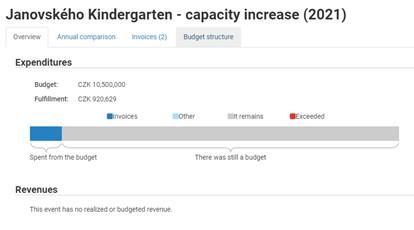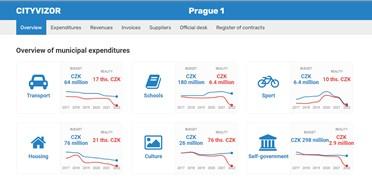Introduction

Budget transparency is a principle that helps governments foster citizens’ trust. Yearly, governments disclose their public financial information when presenting the draft budget, prior to being debated and adopted by the national parliaments. According to the OECD, budget transparency helps increase the accountability, integrity, inclusiveness, and quality of public funding and spending. The OECD’s best practices aligned with the principle of budget transparency note the importance of comprehensive and clear budget reporting that is easily accessible to citizens.
The use of online platforms for increased accessibility of public budget information has helped innovate how governments implement budget transparency. In the Czech Republic, this budget transparency has been promoted through platforms such as Monitor, an information portal launched by the Ministry of Finance in 2013. The information portal aggregates budget and accounting data from the central and local governments and offers users the possibility to analyse the data based on financial and accounting indicators. Although this tool provides exhaustive information on local and central government financial accounts, the accessibility of the information is limited to a high-level description of the revenue and expenses.
In 2015, the Ministry of Finance developed the user-friendly and open source platform Cityvizor, to provide citizens, accountants, and government officials with clear and accessible information on municipalities’ budgets spending. The platform was praised for its contribution to ‘transparency and better functioning of public administration’ and adopted by dozens of municipalities across the Czech Republic. OSOR explored how the open source online platform Cityvizor increased the accessibility and transparency of budgeting data and offered constituents greater insight into how municipalities manage their financial resources through a free and user-friendly interface.
Cityvizor
The online platform Cityvizor is an open source tool for transparent municipal management. The solution was first developed by the Department of Methodology for Financial Control of the Ministry of Finance of the Czech Republic in 2015. The platform was later taken over in 2016 by Otevřená Města (Open Cities), a non-profit organisation specialised in the digitalisation of local governments that helps municipalities save time and money through cooperation when solving digitalisation problems.
Through the Cityvizor platform, local governments are invited to share their financial data with additional details in the form of individual invoices. The platform, accessible through web browsers and mobile compatible, lists the profile pages of the different municipalities that opted to reuse the solution, with each profile page presenting a visual overview of the municipal expenditures. For additional information on the expenditure and revenue, visitors can click through the different groups of expenses, consult each publicly funded project’s budget, and identify local governments’ service or good providers.

After the government of Prague launched the first municipal profile on Cityvizor, 10 Czech cities followed in adopting the platform to give citizens an in-depth overview of their operating and extraordinary expenses. The Prague government’s collaboration with Operator ICT, a municipal ICT service provider, allowed for simpler reuse of the solution thanks to the possibility to integrate data from local governmental accounting systems.
Cityvizor presents the information about the budget that is directly obtained from the accounting systems of the municipalities. In Prague and its districts, Cityvizor processes data from the centralised accounting system most commonly used by the public administrations (GINIS, a secure integration platform for digitalisation, simplification and management of public administrations) and a data connection is created between the accounting system and Cityvizor.
Main features of Cityvizor
Cityvizor is an accessible and transparent municipal management tool, developed under the free GNU AGPL v3 Licence. It offers the following main features:
- Clear and user-friendly interface that allows users to easily identify information, sort expenses and income, and monitor public spending throughout the years;
- Easy access to individual invoices providing details such as type of expenditure, financing, and the list of suppliers for specific events;
- Centralised information on the municipal budgets, their ongoing implementation, and direct access to official bulletin boards and the official Register of Contracts.
Cityvizor is built on four main components.
- The homepage interface, built on the open source JavaScript framework Vue.js, where citizens and municipalities have access to basic information, namely the list of municipalities using the platform, technical documentation, and contact forms.
- The profile page application, developed with the open source web application Angular, to access Cityvizor’s expenditure visualisation tool. Local officials can log into an administrative profile and upload their administration’s accounting data (in .csv format) with the correct input data specification.
- The database, using the open source management system PostgreSQL, where the data of the municipalities is stored.
- The server, set up with the open source tool Node.js (a JavaScript runtime) using Typescript, that adds the data to the database. It is also responsible for the authentication, administrative rights, and regular updating of data provided by local officials with additional information (e.g., latest contracts).
A Demo version of Cityvizor is available to prospective users who wish to test the visualisation features of the platform without sending any data to the server.
Key milestones of the development of Cityvizor
- 2015: Development of the solution by the Ministry of Finance of the Czech Republic.
- 2016: Due to insufficient resources within the Ministry of Finance, Cityvizor is taken over by Open Cities, ensuring the maintenance and development of the platform.
- 2018: A demo of Cityvizor is launched, which allows municipalities already using the GINIS accounting system to try the application.
- 2019: The city of Prague launched the first iteration of platform and facilitated its reuse to any of the interested municipal districts, with the use of over EUR 3.5 billion in public money becoming transparent to citizens.
- Between 2019 and 2021: Česko.Digital joined the project and carried out a hackathon focused on the creation of the new visual identity and designs of Cityvizor. Česko.Digital is a community of digitalisation and technology innovation experts, who work together to support the public sector and NGOs.
- 2020: GORDIC, the operator of the GINIS accounting system developed in cooperation with Operator ICT and with the developer Martin Kopeček, an ODT model which enabled the automatic transformation of data from accounting systems into Cityvizor. This step allows the government of Prague to adopt the application and share it with the municipal districts.
- 2021: A new website with an improved interface was launched following the cooperation of Open Cities with volunteers from Česko.Digital. The update aimed at making budgetary information clear, intuitive, and easier to decipher for all citizens. To respond to users’ interest in assessing how the expenditure changed over the years, simple and readable graphs, the possibility to visualise the data from the official bulletin boards (edesky), as well as the official Register of Contracts were added.

- 2022: introduction of the visualisation of contributory organisations’ budgets.
The development of Cityvizor
In 2015, Ph.D. Tomáš Vyhnánek, at the time Deputy Minister of Finance, acknowledged the public demand to see the public sector more transparently. The Ministry of Finance had previously developed a platform that openly shared financial data. However, the information was difficult for the which was difficult for the general public to interpret. To make public expenditures more understandable, Mr. Vyhnánek decided to develop an application with improved budget visualisation capabilities. The in-house development of the solution was secured by Mr. Vyhnánek who mandated the kickstart of the project, aided by two colleagues within the department who had the required programming skills. The decision to develop Cityvizor as an open source solution was rooted in the conviction of the Ministry developing team that everything made by the public sector with public money should be published openly.
Following 2016, the year when the Ministry of Finance set up a partnership with Open Cities to ensure the continuity of Cityvizor, the development focused on improving and testing the platform, leading to the launch of the demo version in 2018 and the release of the first municipality profile page in 2020. The platform remained open source, in line with Open Cities’ core philosophy and mission of providing open modular solutions to local administrations and combat vendor lock-in.
The release of Cityvizor for the municipal districts of Prague, facilitated by the automatic transformation of data by the accounting system GINIS, led to the growth of the project. This growth demanded an increased focus on the solution’s infrastructure, to ensure that it could host the service for multiple municipalities. Currently, two developers are responsible for maintaining the platform for the entire user base, but the project has benefitted from the contribution of volunteers, making the number of developers involved vary over time.
The submission of feature requests from municipalities
The inclusion of new features is based on the input provided by the municipalities and the specialists at Operator ICT. Open Cities communicates and involves all municipalities when discussing new features, to understand their preferences regarding the future development of the solution. The development and costs are covered by the party requesting the feature since Open Cities’ budget does not allow for the development of new features. The NGO is financed by the membership fees from the participating municipalities, which are distributed among the projects to ensure their maintenance and management. However, if a participating municipality has a good motive for the creation of new features, the development costs can be directly covered by the membership or Cityvizor’s service fees.
The use of Cityvizor within public administrations
As of March 2022, 10 cities in Czech Republic are using the platform or a fork of the software, including several municipal districts within the cities of Prague and Ostrava. The capital city of Prague is currently supporting the involvement of 14 city districts, with more in the preparation stage, while the city of Ostrava has connected 11 city districts.
The reuse of Cityvizor within a municipality depends on the approval from its local council. Once the decision is taken, municipalities are invited to familiarise themselves with the platform and assess if it suits their needs, by being provided access to a demo environment of the solution. As of March 2021, municipalities using the Czech GINIS system can automatically connect their accounting system with Cityvizor. Local administrations that use other systems are required to export their accounting data in a format compatible with the solution, since an automatic connection has not been established.
Open source for municipal budget transparency: benefits and challenges
The benefits of adopting Cityvizor
Municipalities choosing to adopt Cityvizor benefit from a centralised budget visualisation tool that is truly transparent and provides public access to financial data. The user-friendly platform helps feed the political debate on public spending, through the presentation of historical data and detailed invoices and contracts, and auditing of public expenses by experts.
The solution can be promptly tested through the accessible demo page and municipalities that are able to independently implement and set up the software can reuse the code available on GitHub. For municipalities that need support when deciding to reuse Cityvizor, Open Cities remains available to support the importing of their data and verify the accounting data with the support of experts at Operator ICT. For users who wish to explore the data available in the platform, Cityvizor provides an API for downloading data in computer-processable formats.
The challenges of adopting Cityvizor
According to Open Cities, the adoption of Cityvizor by Czech municipalities has faced some obstacles. Local administrations have different methodologies and processes for accounting, which require individual manual adjustments to make the data meaningful and aligned with what the municipality wishes to publish. Another obstacle hindering the uptake of Cityvizor is the delivery of uniform data from all municipalities, as the different types of input and frequency of updates can make it challenging for citizens to analyse data across local administrations. To address these challenges, Cityvizor’s service provider suggests legislation that unifies the level of budgetary and accounting records in detail.
Finally, a political barrier to the reuse of the platform is the need for approval by the local council. This procedure, added to the timely process between the city council’s request and its full implementation, can lead the process to last between six months to a year and a half. To fully implement Cityvizor, each municipality must undergo profile creation, data testing, visualisation control, and finally, the publication of the municipality’s profile.
Highlights from Cityvizor
Good practices highlighted by policymakers
The deployment and adoption of Cityvizor relied on the engagement of the open source and open data community of Czech Republic, starting with the promotion of the platform in public meetings and presentations organised by the Ministry’s development team. The cooperation between the Ministry of Finance and Open Cities on the project, described by Mr. Vyhnánek as exceptional, helped cut developing costs while maintaining the quality of the solution. The involvement of accounting experts working with the municipalities and Operator ICT helped ensure that the financial data is displayed correctly within the platform.
Future developments
Beyond fostering user growth by reaching a bigger number of municipalities, the developers of Cityvizor aim to increase the number of accounting systems that automatically connect with the platform. Municipalities have also requested the possibility to present the budget management of specific public sector organisations (e.g., schools, museums, hospitals), by importing their data into Cityvizor. In 2022, Open Cities aims to continue implementing visualisation features, involve all the municipal districts of Ostrava and Prague, and add regional public budgets, especially the budgets of the regions of Central Bohemia and Karlovy Vary which have expressed interest in the solution.
POLICY CONTEXT
For information regarding the policy context of the use of open source software in the public sector in the Czech Republic, please consult the respective Country Intelligence Report on OSS policies and its corresponding factsheet in the OSOR Knowledge Centre. It includes a detailed overview of the political actors, strategic players, political and legislative initiatives, and public sector open source software initiatives in the Czech Republic.

